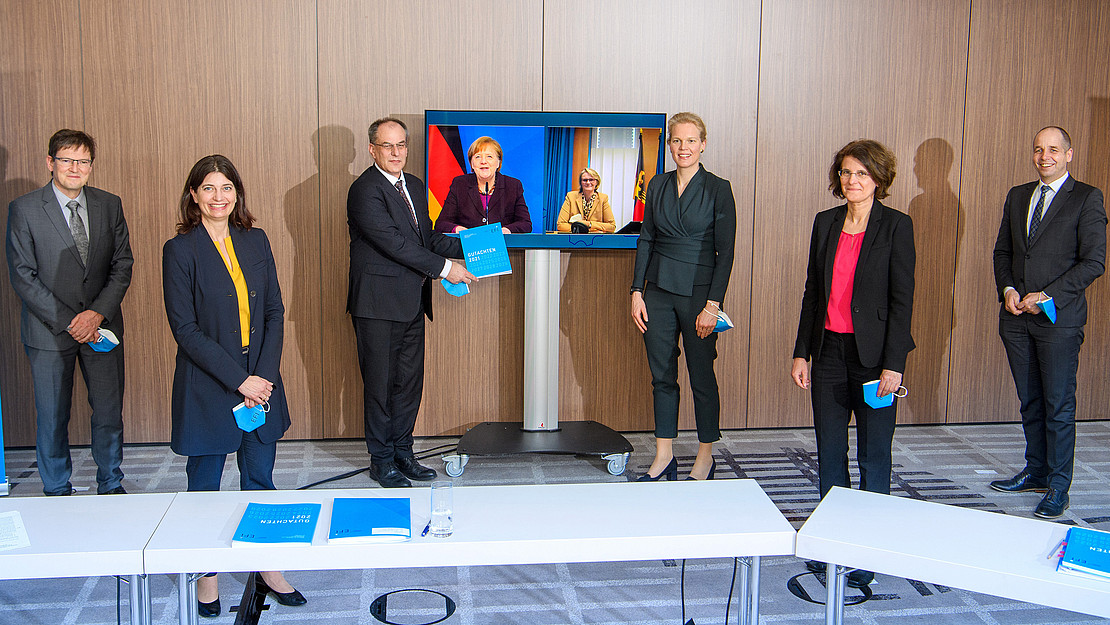This page contains automatically translated content.
Commission of experts: Digitization challenges education and training
 Image: David Ausserhofer.
Image: David Ausserhofer.The report focuses on the challenges for vocational education and training in Germany resulting from the ongoing digitization of the economy and workplaces. In it, Prof. Holger Bonin, Professor of Economics with a focus on labor market and social policy at the University of Kassel and Research Director at the Institute for the Study of Labor (IZA) in Bonn, summarizes the employment consequences of the transition to the digital world of work.
"We will not run out of work in the foreseeable future. In the transformation process, however, many established jobs will fall away, while new ones will be created in other parts of the economy. Since the new jobs require very different skills than the previous ones, there is a great need for further training. At the same time, the trend is toward less routine work. As a result, the demands on professional skills are increasing."
Prof. Till Requate from Kiel University emphasizes that there is therefore an increasing need not only for the technological and digital skills required to design transformative technologies, "but also for so-called classic core skills: Problem-solving skills, creativity, initiative, adaptability and perseverance."
Development of core skills crucial for world of work
"According to EFI's assessment, the development of these core skills is not only crucial for securing individual employment and career opportunities in the digitalized world of work," Requate said. "Only if these core skills are sufficiently available in the workforce can the economic and social potential of new technologies fully unfold and digitization rapidly penetrate all parts of the economy. After all, this is precisely what serves Germany's innovation and competitiveness."
That is why it is so important to the EFI that the system of vocational education and training in Germany keeps pace with the changes in the economy and the world of work brought about by digitization. "To this end, the content and structures of initial and continuing vocational education and training must be further developed and designed in such a way that the core skills for the digitized world of work are taught in line with requirements," says labor market expert Bonin. Companies and people in the workforce have a key role to play here. However, there is an urgent need for impetus from public authorities to strengthen the willingness to adapt and the framework conditions for this.
Against this background, the EFI recommends a number of measures:
- Adapt training design to digitalization
- Make vocational training staff and vocational schools fit for digitization
- Strengthen occupational adaptability through flexible additional qualifications
- Increase occupational mobility through preventive adaptation training
- Expand monitoring of vocational skills
- Improve structures for guidance on job-related continuing education
Bonin concludes on behalf of the EFI team with an appeal to policymakers and business: "We must succeed in adapting our education and training system to the requirements of digitization quickly and agilely. The skilled workforce is a key factor in ensuring that the German economy emerges faster and stronger from the digital transformation. The winners will then also be the workforce. Because qualifications will mean better work and higher incomes in the future, too."
Expectations of the next German government
In addition to digitization in education and training, the EFI also addresses expectations for research and innovation policy from the future German government after the Bundestag elections in September.
While the EFI sees overcoming the Corona crisis as a current, central task for the new federal government, it also wants to see it ensured that "F&I policy continues to be given high priority." The new federal government needs a coherent policy approach that focuses on the entire innovation process - from basic research to application - and to which all ministries are committed, it says.
Background
The Berlin-based Expert Commission on Research and Innovation (EFI) has been providing scientific policy advice to the German government since 2008 and submits an annual report on Germany's research, innovation and technological performance. Germany's technological performance. The main task of the EFI's main task is to assess the strengths and weaknesses of the the strengths and weaknesses of the German innovation system and over time, and to assess the prospects for Germany as a location for research and innovation. evaluate. On this basis, the EFI develops proposals for national research and innovation policy.
Contact:
Expert Commission Research and Innovation (EFI)
Dr. Petra Meurer
Deputy Head of Office
Pariser Platz 6 | 10117 Berlin
T +49 (0) 30 322 982 561
kontakt@e-fi.de
www.e-fi.de